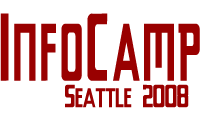Tim Hwang of Harvard Free Culture has a very interesting piece up on his blog about the future of Students for Free Culture. Here is a short part of it on the possible national agenda:
Here are some national projects that I’d love to see Free Culture pursue that haven’t seen much attention.
1) Create A Preemptive Ultimatum Around Creative Works
Sure, we might not agree on the minuate of fair use, but everyone seems to agree that Girl Talk’s work should be defended. Same goes for other artists experimenting with the same methods that threaten the current mode of fair use. Free Culture should create a public list of people and works who are affirmatively protected by the threat of activism. Any organization that goes after them to shut down what is obviously a huge creative boon from remixing and reuse, FC can promise to retaliate against. FC will seed torrents, mass distribute copies, encourage further remixing, and bring in the involvement of litigators working in the space. In other words, we will be a major pain in the ass.
2) Connect With the Development Community
The development community has been wrangling increasingly with Free Culture issues, and there’s a host of natural allies to bring into a project. Many of these, particularly the UAEM community, have demonstrated the efficacy of student activists working in the university space to promote more sensible IP frameworks for innovation. As Benkler has pointed out, Free Culture is far from being limited to a first world issue: access to medicine, technology, and know-how in the developing world is increasingly dependent on an obsolete system of IP that needs resolving. However, no large student group currently acts broadly in the space, though FC is ideally suited to do such a thing.
3) Encourage Open Access Nationally
With the passing of the Open Access resolution at Harvard and efforts at MIT and Stanford, the space now exists for IP freedom activists to begin a full-scale mobilization to promote better public access to educational materials around the country. Many of the technical tools and organizational models to implement this are now being tested in these universities, and the sharing of these practices among student activists massively lowers the cost to universities who are trying to find their way with Open Access. Shooting towards an eventual goal of creating a nationally linked repository of Open Access materials from colleges around the country seems like an obvious resource to aim to create.
4) Promote Data Portability
Free and Open Source Software has been a broadly shared axe to grind for some time now with a bunch of organizations, but it seems like structurally, the salient issue in coming years won’t be merely making code free, but to advocate for data being portable. As the market largely moves towards tethered devices and thin client models, the question of freedom doesn’t turn so much on whether or not a particular software is free or open source — after all Google mostly doesn’t care if you want to go in and see how things work. All the forward-thinking tech company wants is for A) that product to be used, even at the cost of offering it for free, and B) that the data and hosting is kept with them. The real threat to freedom and innovation — as Zittrain’s pointed out — is that data is locked up remotely and that software on platforms increasingly becomes service. What does it mean when Apple can remotely shut down products, or can make movement to another service essentially impossible by raising the barriers to transferring personal information? At least within FC, no one’s been pushing hard on this point, and I think it’s an incredibly salient issue for the community to get involved in.
I strongly agree with basic agenda items of Fair Use, Open Access, Connecting with the Development Community and Data Portability. But what I like most about this agenda is that it is proactive, SFFC needs to be active in defining what Free Culture means and what standards are in the information age. We also need to reach out beyond the rich west to include more people in the FC movement.
Read more at:
http://www.fabulousbitches.org/post/51541293/carving-out-a-free-culture-agenda
PS I need to write a post on Data Portability and a right to have your data deleted. Data portability is essential for creating a landscape where competition can thrive, and a deletion right may be important in a post privacy era. I strongly support data portability, and am deeply conflicted on a deletion right.








 I have submitted two panels to this year’s Nonprofit Technology Conference in San Francisco. Please take a moment to look them over and vote for them if you’re interested:
I have submitted two panels to this year’s Nonprofit Technology Conference in San Francisco. Please take a moment to look them over and vote for them if you’re interested:
